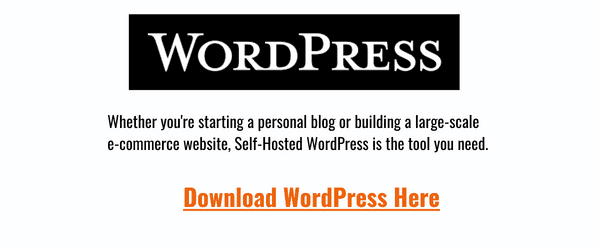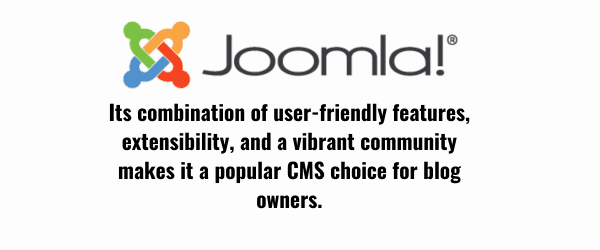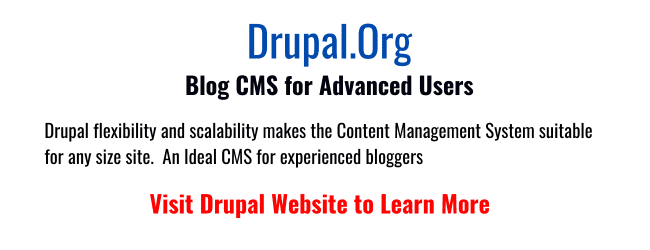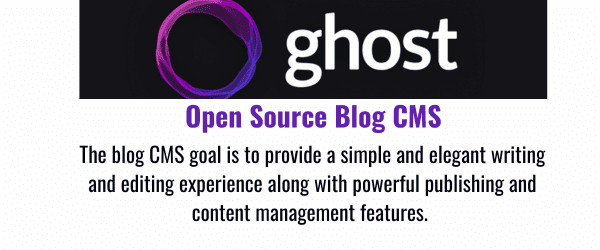
CMS is short for Content Management System. A blog CMS is a piece of software that allows users to create, manage, and publish content on their blog or website.
It’s kind of like having your own virtual diary or newspaper. You can share your thoughts and ideas with others.
Using a blog CMS wiil help you choose how your blog looks. And you may add pictures and videos, and even let other people leave comments.
So a blog CMS (Content Management System) is a tool that helps people create and manage their blogs . It gives bloggers a fun way to express themselves and connect with others online.
And with a blog CMS, bloggers don’t need to be computer experts to own and manage their blogs.
How to Choose the Best Blog CMS
So if you are just starting on the blogging journey we’ll help learn how to choose the best CMS for your blog.
Keep in mind that there are two important ways a Content Management System help bloggers: are::
Create content: The software allows them to write and format blog posts using a text editor. They can include multimedia assets such as images, videos, in their content.
Manage Blog Posts: A CMS provides a centralized dashboard to manage blog posts.. Bloggers can create new posts, edit existing ones from that dashboard.
They can also organize their posts into categories or tags. This is great for easy navigation and searchability.
Disclosure: This Post May Contain affiliate links. It means if you make a purchase by clicking a link on the page, I may be paid a small commission at no cost to you. Thank you!
5 Popular Blog CMS Platforms
So, now let’s look at five of the most popular blog CMS. And we will look at some reasons bloggers and website owers love them.
1. Self-Hosted WordPress
WordPress is one of the most popular Content Management Systems (CMS) in the world, particularly for blogging.
Self-hosted WordPress is an open-source platform that powers millions of websites and blogs.
These are three reasons so many bloggers and website owners use self-hosted WordPress:
Ease of Use
WordPress offers a user-friendly interface, making it accessible to both beginners and experienced users. It has a simple and intuitive dashboard where site owners can create, edit, and manage blog posts with ease.
Themes and Customization
WordPress offers a wide range of free and premium themes to choose from. These themes determine the appearance and design of a blog.
Even Amateur bloggers can easily customize these themes by changing colors, fonts, and layouts to match their personal preferences. This allows them to create professional looking blogs.
Publishing Options
WordPress gives bloggers flexible publishing options. They can publish posts immediately, schedule them for future publication, or save them as drafts.
Bloggers can also set categories and tags to organize their content to improve navigation for their readers.
Overall, self-hosted WordPress offers a powerful and user-friendly blog CMS that is specifically tailored for blogs.
2. Joomla Content Management System
Joomla is an open-source Content Management System (CMS) that allows you to build and manage websites and online applications.
More than 2.5 million websites worldwide use Joomla to manage their content.
This CMS known for its flexibility, extensibility, and ease of use. Its combination of user-friendly features, extensibility, and a vibrant community makes it a popular choice for website and blog owners.
User-Friendly Interface
Joomla provides an intuitive and user-friendly interface that makes it easy to create and manage websites.
The administrative dashboard offers a clean and organized layout. This allows users to navigate and control their website’s content and settings efficiently.
Customizable Templates
Joomla offers a wide range of templates (both free and premium) that determine the visual design and layout of your website.
These templates can be customized to match users’ branding or design preferences. Joomla also supports module positions.
This feature allows website owners to place content blocks and modules in specific areas of their websites.
Community and Support
Joomla has an active and supportive community of developers and users. The community contributes to the development of Joomla and provides support.
The platform offers resources such as forums, documentation, and tutorials to help users build and maintain their sites.
3. WIX.COM
Wix is a cloud-based website builder platform that allows individuals and businesses to create professional-looking websites.
The CMS provides a user-friendly drag-and-drop editor and a wide range of customizable templates. This makes the platform available to users of all skill levels. this inclused brand new bloggers.
Hosting and Security
Wix provides reliable web hosting and takes care of all technical aspects, including security, backups, and server maintenance.
And so bloggers can focus on building and managing your blogs without worrying about the infrastructure.
Support and Resources
Wix offers customer support through various channels, including phone, email, and a help center with tutorials and guides.
They also provide a community forum where users can connect, seek assistance, and share their experiences.
SEO and Marketing Tools
If you choose this blog CMS Wix offers built-in SEO features to optimize your blog for search engines. You can customize meta tags, titles, and descriptions, and even edit the URL structure.
Additionally, Wix provides tools for email marketing, social media integration, and basic analytics to track your site’s performance.
4. Drupal.Org
Drupal CMS is known for its flexibility, scalability, and powerful features. This makes Drupal an excellent choice for complex and content-rich websites.
However, this CMS might have a steeper learning curve compared to some other blog CMS platforms. That is due to Drupal’s advanced capabilities and configuration options.
Flexibility and Scalability
Drupal flexibility and scalability makes the Content Management System suitable for any size site.
The software can handle everything from small blogs to complex, high-traffic websites with thousands of pages. Therefore, a number of famous media companies, universities and government agencies manage their content on Drupal.
User Management
Drupal offers a powerful user management system. Site owners can create user accounts with different roles and permissions.
This allows them to have full control over who has access to various parts of their website. This is especially useful for collaborative websites or websites with multiple content creators.
Security
Drupal has a strong focus on security and regularly releases updates and patches to address any vulnerabilities.
The CMS has a dedicated security team and a robust security framework, making it a reliable choice for websites that require high-security standards.
5. Ghost CMS
Ghost is a modern open-source blog CMS that’s designed specifically for creating and publishing blogs and online publications.
The software’s goal is to provide a simple and elegant writing and editing experience. This is combined with powerful publishing and content management features.
Writing and Editing
Ghost focuses on providing a clean and distraction-free writing environment.
Its editor features a Markdown-based syntax, allowing writers to focus on their content without worrying about complex formatting.
The live preview feature lets users see how their content will appear on the published site in real-time.
Content Management
You can easily create, manage, and organize your blog posts or articles using tags and categories using Ghost CMS. Ghost also includes revision control, enabling bloggers to track and restore previous versions of their content.
The software allows its users to schedule posts for future publication or publish them immediately.
Performance and Speed
Ghost focuses on performance optimization, ensuring fast and efficient website loading.
The platform uses a modern stack and optimized database queries to deliver a responsive and smooth user experience.
Ghost CMS is a popular choice for bloggers and online publications who prioritize writing experience, simplicity, and elegant design.
The CMS focus on minimalism, performance, and developer-friendliness makes it suitable for those seeking a streamlined platform for content creation and publishing.
Bonus Free Blog CMS
Medium.Com is a free blog CMS platform for writers, bloggers, and journalist. However, the average person can use the platform to share ideas.
If you’re not ready to create your own self-hosted blog Medium may be just right for you. In about 30 minutes you can create a profile and start writing.
And doesn’t whether you are just starting to write or are an experienced writer. You can also earn money online with the Medium Partner Program.
Summary
There you have five examples, plus one bonus, of the best blog CMS platforms. We hope this information will be helpful.
- If you are looking to build a website that gives you lot of flexibility based on your changing needs, self-hosted WordPress is the way to go.
- Do you want to easily create a Multi-language website? Then Joomla may the perfect blog CMS platform for you.
- Drupal is the ideal Content Management System for your if your online venture is related to education, media or government.
- If want to build a website to showcase your talent, take a serious look at Wix.
However, the blog CMS you choose depends on what your long-term goal is. So what blog CMS seem right for your, we would love to hear. Leave a comment below.




